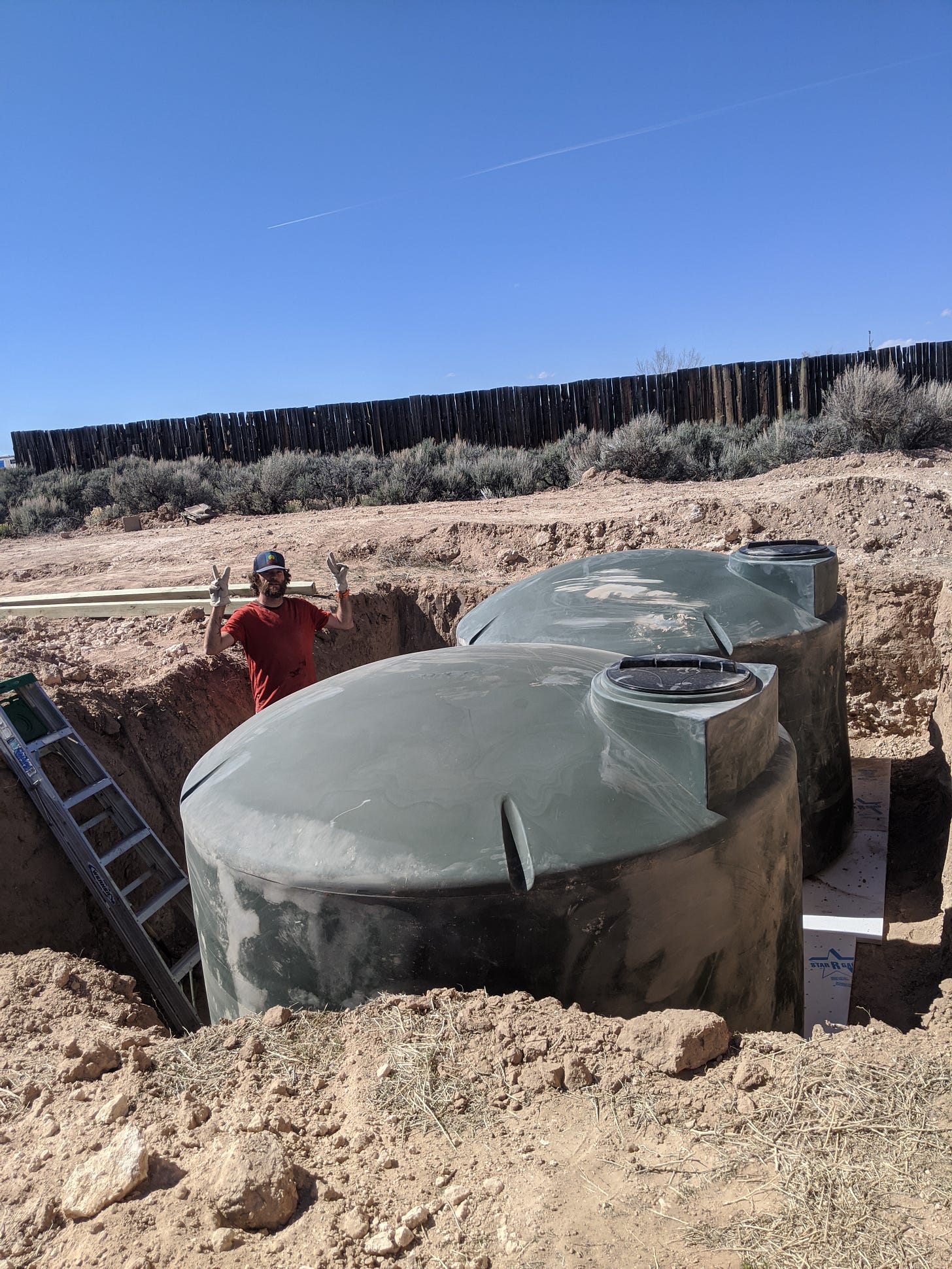Water is Life
How to Get Water in the Desert
Eric spent six weeks non-stop plumbing. Plumbing. Who knew it would be our most challenging endeavor? Everyone, really. No one with building experience takes on plumbing. I did warn Eric. My dad, a carpenter and contractor for many years, always said he'd do anything but plumbing. I even found Eric a plumber that works on off-grid systems, but for some reason I can't understand even after 14 years of marriage, he refuses to hire a plumber.
When we finally had our shower fully built, tiled, grouted, plumbed and curtained. Eric was so excited to take a real shower. It's super dusty out here, working outside in the desert winds. We've been getting by showering outside in our underwear under a solar shower. But then, the water stopped. It just stopped flowing out of the faucet. Something to do with the cisterns being too low, not enough pressure to prime the pump or something I can't wrap my brain around. But I couldn't stop laughing--yes at his expense, as he walked around the house in a towel, still soapy, trying to figure out what the hell was happening--at the irony of the situation.
We live in the desert.
Miles of sagebrush forever. We also live on the rim of a 800' gorge, 50 miles long, that runs through volcanic basalt. Deep in the narrow gorge, the Rio Grande flushes through with Class IV white water rapids. In ten minutes, we can drive down a deathly, curvaceous, narrow, washboard-ridden road and swim in the river's wider current, float a tube across it's gurgling belly. In 20 minutes, we can hike along a flowing mountain stream, carrying snow melt down from New Mexico's highest peak, Wheeler.
But up here on Taos's West Mesa, there's no water. That's why we have cisterns. Being the fancy dirt folk that we are, we got two of them, 1600 gallons each, probably 6-8 weeks worth with our indoor shower and washing machine going regularly. We installed some gutters to collect rain during the wild storm ambushes that gather over us once in a while. This summer, the monsoons were minimal and I heard friends who normally live off rain collection asking the phone number for the water delivery truck.
There is a community well down the road, which was installed only a few years back, just as the road was recently paved a few years before that. With a membership, we can drive our water container over there to be filled.
Water conservation is a big part of living off grid in the desert. We try to conserve it as much as we can. We don't poop in our water, but use a compost toilet instead. Our gray water will eventually water trees in our yard (once we plant them). Because of this, we have to be careful what products we use, making sure they are biodegradable and earth friendly. There's a lot of talk about water is life, el aqua es vida. But how many people think about where their water comes from every time they open a spout, what chemicals they release into the water stream every time they use soaps and cleaning products, and where it all goes when it flows down the drain?
Down the road, a controversy rages over the new well, the Midway Well. There are concerns about the unsustainable environmental impact on our community and water aquifers. Already our water table is descending. Wells are drying up. The rivers depend on precipitation. Every drop becomes precious in the desert. When you are filling your cisterns with mercurial rainfall, every high-efficiency front-loaded batch of laundry, every shower, every dish, ever bottle filled becomes a conscientious labor. As you watch your cistern empty, you can't help but remember how valuable your water is. I look at the clouds differently now.
I guess that's the point of living off grid. Not only to decrease our footprint on our tiny overtaxed planet, but to remember with every drop and every volt and every piece of wood burned, our complete and utter dependency on this planet.






